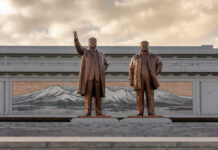
What happens when global authoritarian regimes unite to suppress religious freedom? Russia’s latest crackdown on Falun Gong practitioners reveals a chilling new phase in Beijing’s export of repression.
At a Glance
- Russia intensifies its repression of Falun Gong, following China’s lead.
- The U.S. State Department condemns the actions, calling for religious freedom.
- Practitioners face severe sentences under Russia’s “undesirable” laws.
- Russia-China ties strengthen as they collaborate on transnational repression.
Russia Follows China’s Lead in Repressing Falun Gong
The Russian government has ramped up its crackdown on Falun Gong, a spiritual group originally from China, aligning closely with Beijing’s long-standing persecution. This move has raised alarms internationally, as it mirrors China’s campaign to suppress the movement. Russia’s actions are not just a local concern but a part of a broader pattern of religious repression that is gaining momentum across authoritarian regimes.
For 26 years, the CCP has persecuted the Falun Gong faith group. Now, the CCP has become more sophisticated in the way it exports its repression of the group overseas.
NTD hears an in-depth perspective on this from Nicholas Eftimiades, a retired senior intelligence officer. pic.twitter.com/ozcOq7dsWm
— NTD (@NTD_Live) July 23, 2025
Since 2020, when Russia declared Falun Gong an “extremist organization,” the situation has escalated dramatically. In July 2025, a Moscow court sentenced Natalia Minenkova, a Falun Gong volunteer, to four years in prison, marking the harshest sentence yet for a practitioner in Russia. This severe punishment reflects a frightening trend of increasing hostility towards religious minorities, driven by Moscow’s desire to strengthen its alliance with China.
Global Implications of Russia’s Crackdown
The implications of this crackdown go beyond Russia’s borders. It sets a dangerous precedent for transnational repression, where authoritarian states collaborate to suppress dissent and minority groups. This trend is particularly concerning as it reflects a deeper ideological alignment between Russia and China, where both governments use their legal systems to silence opposition and control religious practices.
Falun Gong practitioners are not the only ones affected. The crackdown instills fear among other minority groups and civil society organizations, further eroding the space for religious and political freedom. This repression raises significant challenges for the international community, which has limited leverage over Russia’s domestic policies but recognizes the threat to global human rights standards.
Watch: Russia Imprisons Falun Gong Practitioner for 4 Years
International Condemnation and Calls for Action
The U.S. State Department and various human rights organizations have condemned Russia’s actions, urging respect for religious freedom and an end to targeting minority faiths. These groups highlight the role of Chinese influence in Russia’s policies, pointing to the strategic value for both countries in aligning on security and ideological issues.
Human rights advocates emphasize the illegality of these prosecutions under international law, regardless of Russia’s domestic legal justifications. They call for stronger international pressure on Moscow, arguing that failing to address these abuses could embolden other authoritarian regimes to adopt similar tactics.

























